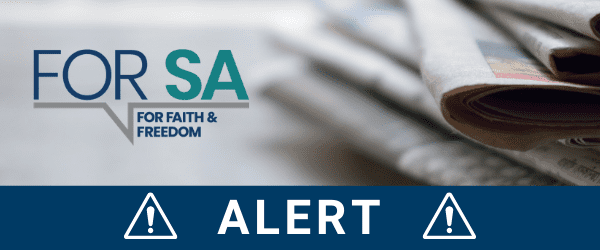Freedom of Religion South Africa (FOR SA) has requested the CRL Rights Commission (CRL) to assist the religious community by intervening in the Minister of Health’s Regulations relating to the surveillance and the control of notifiable medical conditions: Amendment (the “Draft Health Regulations”).
The Minister published the Draft Health Regulations for public comment until Friday, 15 April 2022. Since publication, there has been massive opposition from across South Africa’s religious communities. Thousands of submissions have flooded the Department of Health.
Religious communities were already upset by the pattern of unfair discrimination that they have experienced during Lockdown: Religious workers and organisations are still not recognised as “essential workers”, despite being on the frontlines of the pandemic. FOR SA and other parties filed a legal action for unfair discrimination when religious gatherings were shut down completely while casinos, fitness clubs etc. were allowed to operate. Large scale political events and rallies continued without any police interference, but helicopters, rubber bullets and batons were used to break up prayer meetings.
“There is evidently no further need for Government to continue with any form of lockdown, let alone to expand and extend these powers indefinitely through Regulations issued under the National Health Act”, says Michael Swain, FOR SA’s Executive Director. “Many in the religious community are deeply concerned that the Draft Health Regulations will simply continue the rule by an unaccountable Executive under the guise of ‘saving lives’ from the COVID-19 pandemic.”
FOR SA notes that the Draft Health Regulations grossly and unjustifiably violate religious freedom rights: “Medical apartheid” is imposed by requiring proof of vaccination as an entry requirement for congregants who want to attend any gathering of over 1,000 people indoors or 2,000 outdoors. The Draft Health Regulations further allow for the possibility of compelled “treatment”, which is undefined and could include compulsory vaccination. Provision is also made for compulsory quarantine in a State facility. All these infringements on constitutional rights are activated whenever the Minister defines any disease, no matter how mild, as a “notifiable medical condition” (“NMC”). Failure to comply with the Regulations is a crime, punishable with up to 10 years in prison and/or a limitless fine.
“The Regulations put both religious people and religious organisations in the invidious position of having to decide between obeying God or man,” says Swain, “However the Constitutional Court has clearly stated that the ‘State should, wherever reasonably possible, seek to avoid putting believers to extremely painful and intensely burdensome choices of either being true to their faith or else respectful of the law’. It is for this reason that we are asking the CRL to intervene in this matter and to assist the religious communities.”
The CRL is empowered by the CRL Act (specifically sections 5(1)(g) and 5(1)(h)) to intervene in such matters because the Act gives the CRL the power to facilitate the resolution of friction between religious communities the State where religious rights are affected. Hence FOR SA’s request for intervention by the CRL as the Draft Health Regulations directly infringe upon the rights of religious people and communities.

